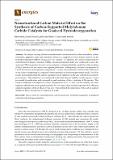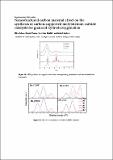Por favor, use este identificador para citar o enlazar a este item:
http://hdl.handle.net/10261/203907COMPARTIR / EXPORTAR:
 SHARE SHARE
 CORE
BASE CORE
BASE
|
|
| Visualizar otros formatos: MARC | Dublin Core | RDF | ORE | MODS | METS | DIDL | DATACITE | |

| Título: | Nanostructured carbon material effect on the synthesis of carbon-supported molybdenum carbide catalysts for guaiacol hydrodeoxygenation |
Autor: | Ochoa, Elba CSIC; Torres Gamarra, Daniel CSIC ORCID; Pinilla Ibarz, José Luis CSIC ORCID ; Suelves Laiglesia, Isabel CSIC ORCID | Palabras clave: | Mo2C catalysts Nanostructured carbon materials Hydrodeoxygenation of guaiacol Carbothermal hydrogen reduction |
Fecha de publicación: | 5-mar-2020 | Editor: | Multidisciplinary Digital Publishing Institute | Citación: | Energies 13(5): 1189 (2020) | Resumen: | The impact of using different nanostructured carbon materials (carbon nanofibers, carbon nanotubes, graphene oxide and activated carbon) as a support for Mo2C-based catalysts on the hydrodeoxygenation (HDO) of guaiacol was studied. To optimise the catalyst preparation by carbothermal hydrogen reduction (CHR), a thermogravimetric study was conducted to select the optimum CHR temperature for each carbon material, considering both the crystal size of the resulting β-Mo2C particles and the extent of the support gasification. Subsequently, catalysts were prepared in a fixed bed reactor at the optimum temperature. Catalyst characterization evidenced the differences in the catalyst morphology as compared to those prepared in the thermogravimetric study. The HDO results demonstrated that the carbon nanofiber-based catalyst was the one with the best catalytic performance. This behaviour was attributed to the high thermal stability of this support, which prevented its gasification and promoted a good evolution of the crystal size of Mo species. This catalyst exhibited well-dispersed β-Mo2C nanoparticles of ca. 11 nm. On the contrary, the other supports suffered from severe gasification (60–70% wt. loss), which resulted in poorer HDO efficiency catalysts regardless of the β-Mo2C crystal size. This exhibited the importance of the carbon support stability in Mo2C-based catalysts prepared by CHR. | Descripción: | © 2020 by the authors.-- 9 figures, 3 tables.-- Supplementary material available. | Versión del editor: | http://dx.doi.org/10.3390/en13051189 | URI: | http://hdl.handle.net/10261/203907 | DOI: | 10.3390/en13051189 | E-ISSN: | 1996-1073 |
| Aparece en las colecciones: | (ICB) Artículos |
Ficheros en este ítem:
| Fichero | Descripción | Tamaño | Formato | |
|---|---|---|---|---|
| Nanostructured_Ochoa_Art2020.pdf | Artículo principal | 6,64 MB | Adobe PDF |  Visualizar/Abrir |
| energies-13-01189-s001.pdf | Información suplementaria | 638,62 kB | Adobe PDF |  Visualizar/Abrir |
CORE Recommender
SCOPUSTM
Citations
7
checked on 03-abr-2024
WEB OF SCIENCETM
Citations
8
checked on 25-feb-2024
Page view(s)
166
checked on 18-abr-2024
Download(s)
238
checked on 18-abr-2024
Google ScholarTM
Check
Altmetric
Altmetric
Este item está licenciado bajo una Licencia Creative Commons

